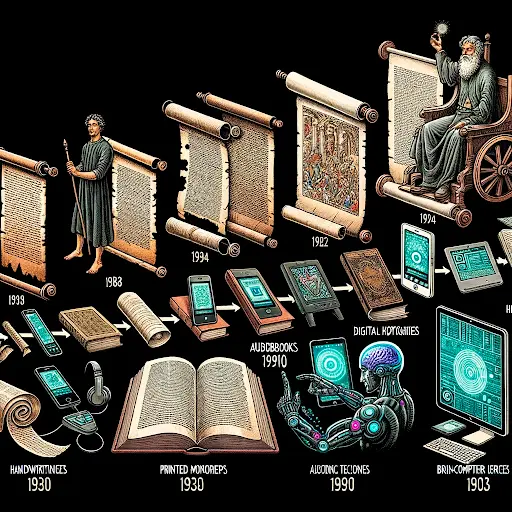The future of reading electronic books
Updated: 25 February 24
4
How Audiobooks Are Shaping the Future of Reading
In the ever-evolving world of literature, audiobooks have quietly stolen the spotlight, turning the solitary act of reading into an experience we can enjoy while juggling the demands of our fast-paced lives. As we gear up for 2024, it’s clear that audiobooks aren’t just a passing trend—they’re reshaping what it means to be a reader today.
Let’s dive into how audiobooks are transforming our reading habits and highlight some of the exciting trends that are set to define the next chapter in storytelling.

The Audiobook Revolution: A New Chapter in Reading
Gone are the days when reading meant sitting down with a physical book in hand. Today, audiobooks offer a way to immerse ourselves in stories while on the move, turning mundane tasks like commuting or doing household chores into opportunities for adventure, learning, and escape.
This shift is largely thanks to advancements in technology, which have made audiobooks more accessible than ever before through smartphones, smart speakers, and user-friendly apps.

What’s on the Horizon for 2024?
Making Reading Accessible to All
One of the most beautiful aspects of audiobooks is their ability to open up the world of literature to more people. Whether it’s someone with visual impairments, learning differences, or those who simply find comfort in listening, audiobooks ensure that everyone has a place at the table.
In 2024, we can expect even more titles to be available in audio format, along with a richer diversity of voices and languages that reflect the world in all its variety.

Audiobooks and the Smart Home Symphony
Imagine asking your home to play your current audiobook while you cook, or pause it as you drift off to sleep. This seamless interaction with smart home devices is set to get even smoother, integrating audiobooks into the rhythm of our daily lives like never before. It’s not just about convenience; it’s about creating a listening experience that flows with us, from room to room, task to task.
AI and the Personal Touch
Artificial intelligence is gearing up to add a personal twist to audiobooks, with AI narration becoming more natural and engaging. But it’s not just about the voice; it’s about tailoring recommendations to fit our unique tastes, moods, and moments.
Imagine your audiobook app suggesting the perfect story for a rainy afternoon or a motivational gem to kickstart your Monday morning. That’s the kind of personalization we’re looking forward to in 2024.

Choose Your Own Adventure: Audiobook Edition
Remember those “choose your own adventure” books from childhood? They’re making a comeback in audio form, offering interactive stories that let us steer the plot with our decisions. This immersive twist on storytelling not only makes for a thrilling listen but also rekindles the joy of being an active participant in the story, appealing especially to the gamer and tech-savvy generations.
Stories Without Boundaries: Cross-Media Collaborations
The future of audiobooks is not confined to the written word. Expect to see more collaborations that blur the lines between books, films, TV shows, and video games. From audiobooks that delve deeper into the lore of a blockbuster movie to narratives that bring video game worlds to life, these crossovers are a testament to the limitless possibilities of storytelling.

Wrapping Up
As we look ahead to 2024, it’s clear that audiobooks are doing more than just changing how we “read”—they’re redefining what it means to be a reader in the digital age. With each passing year, audiobooks continue to break down barriers, making stories more accessible, engaging, and personalized. Whether through technological innovations, enhanced inclusivity, or new ways to experience stories, audiobooks are indeed shaping the future of reading in exciting and unexpected ways. Here’s to the next chapter in the audiobook revolution, where every listener finds a story that resonates, a voice that comforts, and a world to get lost in.

Please Write Your Comments